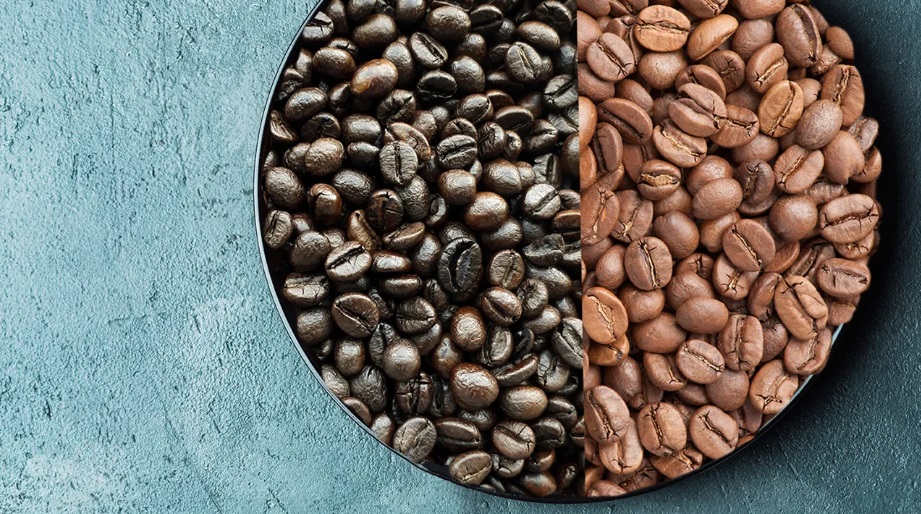
French Roast coffee stands out in the coffee world due to its dark, smoky flavor and rich, bold aroma. It is named not for the origin of the beans, but for the degree of roast, which is among the darkest on the roasting spectrum. This roast level is characterized by beans that are nearly black, glistening with oils, and have a pronounced smoky flavor that some coffee lovers crave.
The roasting process plays a pivotal role in defining the flavor and strength of French Roast coffee. During roasting, the beans are heated to temperatures that cause the beans to undergo significant chemical reactions. As the beans darken, they lose some of their original fruity and floral notes and develop deeper, toastier flavors.
Interestingly, this process also impacts the caffeine content of the beans. Although it seems counterintuitive, the longer roasting time actually reduces the caffeine content compared to lighter roasts. This happens because caffeine degrades under the intense heat over extended periods.
Is French Roast Coffee Strong?
When we talk about the strength of French Roast coffee, it’s important to clarify what “strong” means in this context. French Roast is strong in terms of flavor intensity—its bold, smoky taste can dominate the palate and linger long after the coffee is sipped. However, if we measure strength by caffeine content, French Roast is actually less potent than its lighter roasted counterparts. This is due to the caffeine diminishing during the longer roasting process.
Key Takeaways
- French Roast coffee is a distinctive choice within the coffee spectrum, recognized for its particularly dark roast. This coffee variety is known for its smoky and sometimes bitter flavor, which comes from beans that have been roasted until they start to smoke and the oils surface, giving them a shiny appearance.
- One notable characteristic of French Roast coffee is its caffeine content. Despite its robust flavor, French Roast actually contains less caffeine than lighter roasts. This reduction in caffeine is due to the prolonged roasting process, where more caffeine burns off as the beans are exposed to high heat for a longer duration.
- When it comes to brewing French Roast coffee, certain methods tend to enhance its unique qualities better than others. The French Press, for example, is ideal for extracting the deep, rich flavors from these darkly roasted beans. Espresso machines also work well, capitalizing on the oiliness of the beans to produce a bold, flavorful shot. Drip coffee makers are another suitable option, offering a convenient way to enjoy the smoky notes of French Roast in your daily cup.
Characteristics of French Roast Coffee
French Roast coffee, known for its dark, enigmatic appeal, is often a point of curiosity among coffee enthusiasts. The beans themselves are notable for their dark chocolate, almost black color, and a shiny, oily surface. This glossiness is due to the oils that rise to the surface during the extensive roasting process. These beans are roasted beyond the “second crack”—a term used to describe the sound of coffee beans cracking again under the heat, indicating a deeper roast level.
The flavor profile of French Roast coffee is predominantly smoky and can carry hints of dark chocolate or even a charred wood taste, which comes from the beans being taken almost to the point of burning. Unlike milder roasts, the original flavors of the bean are mostly overshadowed by the strong roasted characteristics. This results in a cup of coffee that is less about the subtleties of the bean’s origin and more about the intensity of the roast. The texture of the brewed coffee is often full-bodied and may have a creamy feel, especially when brewed using methods that maximize oil extraction like espresso or French press.
Comparing French Roast to other dark roasts, such as Italian Roast or Espresso Roast, can highlight its unique qualities. While all dark roasts share a deep color and robust flavor, French Roast typically sits in the middle of the spectrum. It’s darker than a Full City Roast, which still retains some of the bean’s original flavors, but not as extreme as Italian Roast, which pushes the beans towards a nearly burnt state. Espresso Roast, on the other hand, is usually less intense than French Roast, optimized for a balance that works well under the high pressure of espresso brewing.
Brewing the Perfect Cup of French Roast
Brewing a perfect cup of French Roast coffee is all about embracing its bold, intense flavors. To start, consider the coffee-to-water ratio, which is crucial for extracting the full range of flavors without over-extraction. A general rule for French Roast is to use about 2 tablespoons of coffee for every 6 ounces of water. This ratio can be adjusted slightly depending on your taste preferences—if you like a stronger brew, add a bit more coffee.
When it comes to brewing methods, French Roast coffee shines with certain techniques that highlight its robust characteristics. The French Press is ideal because it allows the coffee oils and fine particles to remain in the final cup, enhancing the coffee’s full-bodied texture and rich, smoky flavor. For espresso lovers, French Roast can produce a deeply flavorful and aromatic shot, perfect for those who enjoy a bold espresso.
If you’re using a drip coffee maker, make sure to use a slightly coarser grind to prevent the coffee from becoming too bitter. Regardless of the method, ensure your brewing equipment is clean to avoid any residual flavors from previous brews, which can detract from the pure, intense flavors of the French Roast.
Health and Consumption
French Roast coffee, like other dark roasts, is noted not only for its bold flavor but also for its potential health benefits. This type of coffee is rich in antioxidants, which help reduce inflammation and combat free radicals in the body. Despite its reduced caffeine content compared to lighter roasts, French Roast can still offer a noticeable boost in energy and mental alertness, making it a suitable choice for morning consumption or an early afternoon pick-me-up.
Regarding its consumption throughout the day, the robust flavor profile of French Roast makes it especially enjoyable in the morning or after a meal, where its smoky, intense flavors can be fully appreciated. However, given its lower caffeine content, it’s also a good option for those who desire a less intense caffeine impact in the late afternoon.
FAQs
Is French Roast suitable for making espresso?
Absolutely! French Roast is an excellent choice for espresso due to its bold flavors and oily texture, which can produce a rich, creamy espresso shot. Its strong profile cuts through milk well, making it perfect for lattes and cappuccinos.
How can I adjust the strength of French Roast coffee?
To tweak the strength of your French Roast, you can alter the coffee-to-water ratio. For a stronger brew, increase the amount of coffee grounds. Conversely, for a milder cup, use less coffee relative to water. Experimenting with different grind sizes can also influence the strength and flavor extraction.
How does French Roast compare to other roasts?
French Roast is darker than most other roasts, which generally gives it a smokier and more intense flavor. It’s less acidic than lighter roasts and has a fuller body compared to medium roasts. Its unique characteristics are due to the prolonged roasting time, which brings out a deep, rich taste.
Final Thoughts
French Roast coffee offers a distinctively bold and smoky flavor that stands out from other roasts. Its lower caffeine content compared to lighter roasts makes it a superb choice for those who prefer intense flavor without a high caffeine kick. Whether you enjoy it black or with milk, French Roast provides a robust coffee experience, appealing particularly to those who cherish a strong, flavorful cup. This roast is versatile in brewing methods, suiting anything from a drip coffee maker to a sophisticated espresso machine.









